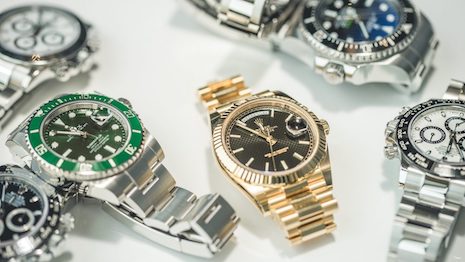 Chinese consumers have shown little resistance to making big-ticket purchases online. Image credit: Shutterstock
Chinese consumers have shown little resistance to making big-ticket purchases online. Image credit: Shutterstock
By Jing Daily
The following is an excerpt from Jing Daily’s market report “The Secrets To Selling Hard Luxury To China’s Gen Z.” Packed with 73 pages of market research, spotlight interviews with industry insiders and brand executives, and revenue-generating consumer insights, the report is a must-read for anyone interested in understanding — and effectively reaching — China’s next generation of luxury watch and jewelry buyers. Get your copy today on Jing Daily's Reports page.
While it has struggled to gain a strong foothold in the West, ecommerce-enabled livestreaming is already big business in China, and has evolved from its early days of being a means for viewers to “tip” musicians and comedians to a proven way for luxury brands to reach young audiences and move inventory.
Luxury brands were relatively slow to experiment with ecommerce livestreaming, but this has changed rapidly since Louis Vuitton launched its first sales-enabled livestream on Xiaohongshu in March 2020.
Soon after, Net-A-Porter sold luxury leather goods by teaming up with A-list handbag influencer Mr. Bags (Tao Liang, b. 1992) on Alibaba’s Taobao Live platform.
In August 2020, Kering-owned Bottega Veneta partnered with livestreaming super-influencer Li Jiaqi on a livestream in which Li sold the entire inventory of 230 Mini Pouch bags (priced at $1,910 each) in just 10 seconds.
Also in 2020, one of the most important hard luxury events of the year, Watches & Wonders Geneva shifted to an entirely online format open to the public.
For the Chinese market, Watches & Wonders went a step further with an expansive livestreaming campaign in partnership with Tmall Luxury Pavilion and Net-A-Porter.
Running over five days in April 2020, the Watches & Wonders Tmall Watch Show included the debuts of more than 100 new models from nine Richemont watch brands, including Panerai, Jaeger-LeCoultre, Piaget and Cartier, which also launched its own global platform in English, French and Chinese.
In a twist, many of the new products were made available for sale once they appeared on the show, a rarity for luxury brands, which typically use such events to preview upcoming collections.
Later that year, Watches & Wonders held an exclusive offline event in September that included shoppable showcases in partnership with Tmall Luxury Pavilion that included curated online content and immersive experiences promoting new watches.
Eleven European watch brands took part in this event, with an estimated 250,000 people watching the event livestream on Tmall. Due to the pandemic, the event was much smaller than before and could be described as akin to a small gathering, rather than a large-scale trade show.
In 2021, Watches & Wonders Geneva again leveraged the popularity of ecommerce livestreaming by launching another live online event in April, once again in collaboration with Net-A-Porter. The online event was followed by a four-day offline exhibition in Shanghai, in which 19 luxury watch brands participated, nearly doubling the number of brands from the September 2020 showcase.
Over the course of this installment, some 12,000 visitors attended the offline component, while 110,000 visited the event Web site, with more than 360,000 social media mentions of the official hashtag #2021Watches&Wonders — a new record for the event.
In addition to actors and musicians, hard luxury brands are turning to top Chinese livestreamers to spread the word to their millions of followers and, increasingly, sell via apps such as Taobao Live.
According to Data100, 73 percent of China’s active livestream shoppers are millennials and Gen Zers – between the ages of 20 and 40 – and China’s livestreaming market is poised to surpass RMB 80 billion ($12.5 billion) in 2021 and RMB 100 billion ($15.7 billion) by 2023.
Looking to leverage the livestreaming e-commerce boom, Hong Kong jeweler Chow Tai Fook followed Bottega Veneta’s lead and collaborated with Li Jiaqi for a charity livestream in 2020 to support Wuhan’s COVID relief efforts. In a span of just 30 seconds, the influencer sold 5,000 necklaces priced at an affordable, charity-friendly RMB 500 ($79).
Despite the promise and proven sales ability of ecommerce livestreaming, however, challenges remain.
For starters, brands still rely heavily on already influential livestreamers to draw audiences and drive sales. And leveraging this influence does not come cheaply or without its own set of difficulties, from the high costs of working with these individuals to the fact that they work with dozens, sometimes hundreds, of brands, meaning their audiences may not feel a collaboration with a hard luxury brand is particularly authentic or that the influencer is a credible source of information on watches or jewelry.
Get your copy of “The Secrets to Selling Hard Luxury To China’s Gen Z” on Jing Daily's Reports page.
Published with permission from Jing Daily. Adapted for clarity and style.